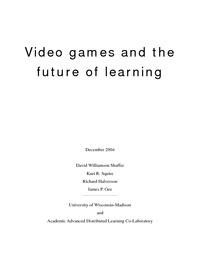Video games and the future of learning Publikationsdatum:
|
 |
 Diese Seite wurde seit 5 Jahren inhaltlich nicht mehr aktualisiert.
Unter Umständen ist sie nicht mehr aktuell.
Diese Seite wurde seit 5 Jahren inhaltlich nicht mehr aktualisiert.
Unter Umständen ist sie nicht mehr aktuell.
 Zusammenfassungen
Zusammenfassungen
 Will video games change the way we learn? We argue here for a particular view of games—and of learning—as activities that are most powerful when they are personally meaningful, experiential, social, and epistemological all at the same time. From this perspective, we describe an approach to the design of learning environments that builds on the educational properties of games, but deeply grounds them within a theory of learning appropriate for an age marked by the power of new technologies. We argue that to understand the future of learning, we have to look beyond schools to the emerging arena of video games. We suggest that video games matter because they present players with simulated worlds: worlds which, if well constructed, are not just about facts or isolated skills, but embody particular social practices. Video games thus make it possible for players to participate in valued communities of practice and as a result develop the ways of thinking that organize those practices. Most educational games to date have been produced in the absence of any coherent theory of learning or underlying body of research. We argue here for such a theory—and for research that addresses the important questions about this relatively new medium that such a theory implies.
Will video games change the way we learn? We argue here for a particular view of games—and of learning—as activities that are most powerful when they are personally meaningful, experiential, social, and epistemological all at the same time. From this perspective, we describe an approach to the design of learning environments that builds on the educational properties of games, but deeply grounds them within a theory of learning appropriate for an age marked by the power of new technologies. We argue that to understand the future of learning, we have to look beyond schools to the emerging arena of video games. We suggest that video games matter because they present players with simulated worlds: worlds which, if well constructed, are not just about facts or isolated skills, but embody particular social practices. Video games thus make it possible for players to participate in valued communities of practice and as a result develop the ways of thinking that organize those practices. Most educational games to date have been produced in the absence of any coherent theory of learning or underlying body of research. We argue here for such a theory—and for research that addresses the important questions about this relatively new medium that such a theory implies. Dieser Text erwähnt ...
Dieser Text erwähnt ...
 Personen KB IB clear | Jean Lave , Etienne Wenger | ||||||||||||||||||
 Aussagen KB IB clear | Computerspiele fördern Lernen | ||||||||||||||||||
 Begriffe KB IB clear |  Computer Computer computer
, computer
,  Computerspiele Computerspiele computer game
, computer game
,  Lernen Lernen learning
, Simulation
, learning
, Simulation
,  Virtual Reality Virtual Reality virtual reality
, Virtualitätvirtuality virtual reality
, Virtualitätvirtuality
| ||||||||||||||||||
 Bücher |
|
 Dieser Text erwähnt vermutlich nicht ...
Dieser Text erwähnt vermutlich nicht ... 
 Nicht erwähnte Begriffe | Schule |
 Tagcloud
Tagcloud
 Zitationsgraph
Zitationsgraph
 Zitationsgraph (Beta-Test mit vis.js)
Zitationsgraph (Beta-Test mit vis.js)
 3 Erwähnungen
3 Erwähnungen 
- Serious Games and Edutainment Applications (Minhua Ma, Andreas Oikonomou, Lakhmi C. Jain) (2012)
- 21. Experiences of Promoting Student Engagement Through Game-Enhanced Learning (Therese Charles, David Bustard, Michael David Black)


- 21. Experiences of Promoting Student Engagement Through Game-Enhanced Learning (Therese Charles, David Bustard, Michael David Black)
- Disruptive Fixation - School Reform And The Pitfalls Of Techno-Idealism (Christo Sims) (2017)

- Lernen mit Bildungstechnologien - Praxisorientiertes Handbuch zum intelligenten Umgang mit digitalen Medien (Helmut M. Niegemann, Armin Weinberger) (2019)
- 18. Lernspiele und Gamification (Jacqueline Schuldt)


- 18. Lernspiele und Gamification (Jacqueline Schuldt)
 Volltext dieses Dokuments
Volltext dieses Dokuments
 |  Video games and the future of learning: Artikel als Volltext ( Video games and the future of learning: Artikel als Volltext ( : :  , 55 kByte; , 55 kByte;  : :  Link unterbrochen? Letzte Überprüfung: 2020-11-28 Letzte erfolgreiche Überprüfung: 2020-10-28) Link unterbrochen? Letzte Überprüfung: 2020-11-28 Letzte erfolgreiche Überprüfung: 2020-10-28) |
 Anderswo suchen
Anderswo suchen 
 Beat und dieser Text
Beat und dieser Text
Beat war Co-Leiter des ICT-Kompetenzzentrums TOP während er Dieser Text ins Biblionetz aufgenommen hat. Die bisher letzte Bearbeitung erfolgte während seiner Zeit am Institut für Medien und Schule. Beat besitzt kein physisches, aber ein digitales Exemplar. Eine digitale Version ist auf dem Internet verfügbar (s.o.). Aufgrund der wenigen Einträge im Biblionetz scheint er es nicht wirklich gelesen zu haben. Es gibt bisher auch nur wenige Objekte im Biblionetz, die dieses Werk zitieren.







 Biblionetz-History
Biblionetz-History